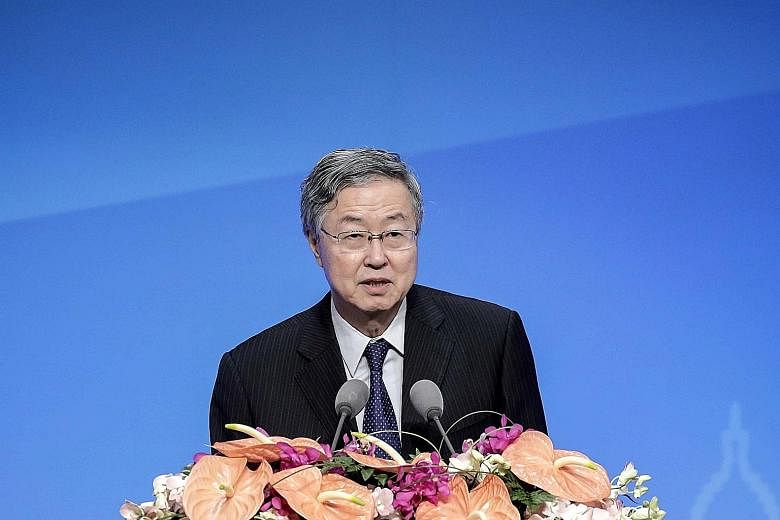BEIJING • People's Bank of China (PBOC) governor Zhou Xiaochuan made a fresh call to open up the country's financial sector, and warned that reform will become more difficult if the window of opportunity is missed.
In an interview published late on Monday with the Chinese financial magazine Caijing, the country's longest-serving central bank chief defined a "troika" of drivers needed to further open up the economy, citing greater foreign trade and investment, a more market-based foreign exchange rate mechanism with a "reasonable and balanced" yuan rate, and the relaxation of capital controls to allow use of the yuan to be gradually freed.
In timing his intervention just before China's Communist Party hunkers down for its once-in-five-years leadership transition next week, Mr Zhou is burnishing his position as an advocate of financial openness in the months before his expected retirement.
While China has ambitions to make its currency a global means of exchange, the world's second-largest economy still operates behind a barrier of exchange curbs and restrictions on foreign investment.
"There isn't a single country in the world that can achieve an open economy with strict foreign exchange controls," Mr Zhou said in the wide-ranging interview, which looked back at the coun-try's financial and currency reforms over decades and marked one year since the International Monetary Fund added the yuan as the fifth component of its reserve-currency basket.
"The time window is very important for reforms, an appropriate window must be seized. Once missed, the cost of reform will be higher in the future."
Since taking the central bank's reins in December 2002, Mr Zhou has steered the country through global crises, overhauled monetary policy tools, ended a direct peg to the US dollar, abolished a cap on deposit rates and overseen the elevation of the yuan to reserve-currency status.
"The main message of Zhou's interview is that China has passed the point of no return," said Mr Raymond Yeung, chief economist for Greater China at Australia and New Zealand Banking Group in Hong Kong.
"After 40 years of opening-up policy, foreign participation in the financial industries has not been up to speed, requiring a bold reform to take it forward."
With Mr Zhou's comments raising the spectre of imminent reform, bets on swings in the yuan ticked higher yesterday.
One-month implied volatility jumped to the highest level since January, and the currency also appreciated on shore.
But the PBOC boss' zeal for change does not necessarily signal that a shift will be forthcoming once the Communist Party seals its leadership transition, said Mr Tom Orlik, chief Asia economist of Bloomberg Intelligence in Beijing.
"This reflects Zhou's long-held view and a policy he has been pursuing for his entire career, not a signal that reform is about to accelerate or change direction," Mr Orlik wrote in a note.
BLOOMBERG

